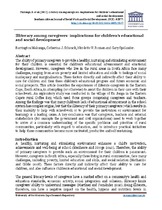Illiteracy among caregivers: implications for children’s educational and social development
Date
2017Author
Makunga, Barrington
Schenck, Catherina
Roman, Nicolette V.
Spolander, Gary
Metadata
Show full item recordAbstract
The ability of primary caregivers to provide a healthy, nurturing and stimulating environment for their children is essential for children’s educational advancement and emotional development. However, caregivers who live in the rural areas in South Africa face many challenges, ranging from acute poverty and limited education and skills to feelings of social inadequacy and marginalisation. These factors directly and indirectly affect their ability to care for children and thus these children’s educational progress and future economic and social prospects. This article describes the experiences of illiterate caregivers in the Eastern Cape, South Africa, in attempting (or otherwise) to assist the children in their care with their schoolwork. An exploratory study was conducted in the village of Ku Jonga in the Eastern Cape’s rural Coffee Bay, which used focus groups comprising caregivers and teachers. Among the findings was that many children’s lack of educational advancement in the school system has complex origins, but that the illiteracy of their primary caregivers (which results in their inability to help with schoolwork or to provide the motivation or environment for learning) is a leading cause. A key conclusion was that caregivers, teachers and external stakeholders (for example the government and civil organisations) need to work together to arrive at a common understanding of the specific problems and priorities of rural communities, particularly with regard to education, and to introduce practical initiatives to help these communities become more motivated, productive and self-sustaining.

